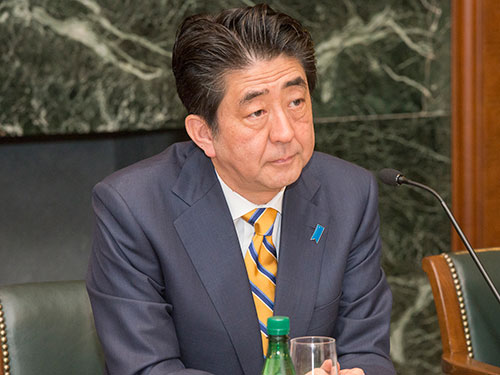
This article was originally published by the East Asia Forum on 9 October, 2015.
Japan’s new security laws, which were passed on 19 September and allow for limited forms of collective self-defence, have been described as a ‘move away from pacifism’, the opening of a ‘Pandora’s box’ and the ‘unsheathing of a new Japanese sword’. But considering the bill’s extreme limitations and significant domestic constraints — including a greying and shrinking population, mounting domestic debt and deeply embedded pacifist norms — one wonders how and why this narrative has taken root so deeply.
Both Chinese and Koreans experienced the brunt of the brutality of Japanese colonialism and imperialism. They have deep reservations concerning any move away from the strictest interpretation of the Article 9 ‘peace clause’ of the constitution. At the same time, both nations are cognisant of Japan’s post-World War II pacifist culture, behaviour and significant commitment to international law and norms. They are also aware that Japan has been incrementally changing its security policy over the past 25 years to play a more proactive role in not only its own security but also in international peacekeeping.
Stoking fears over Japan’s remilitarisation is nothing new to the region’s political machinations and competition for influence. Chinese President Xi Jinping’s 3 September 2015 speech marking the 70th anniversary of World War II repeatedly reminded listeners of Japan’s militarist past and the need to protect against future aggression targeted at China. Similarly, South Korean President Park in her speech on 15 August chastised Prime Minister Abe for not directly upholding previous apologies by Japanese governments in his speech marking the anniversary. She called upon Japan to ‘win the trust of its neighbours and the international community’.
Implicit in this rhetoric is the idea that Japan remains a threat, and that changes to its security policy are a manifestation of that threat. This is a false narrative, but it serves the political constituencies in both countries who represent the core supporters for both Park and Xi, and it is a useful diversion from domestic political shortcomings.
In Japan, opposition parties effectively outmanoeuvred Prime Minister Abe in controlling the narrative around the new security bill. By framing the reforms as a ‘War Bill’ enabling militarism through an undemocratic process, they skilfully mobilised support for their opposition to the bill. Opposition parties thus created the conditions for other grassroots organisations to propagate even more misleading narratives that the government was ‘fascist’ and ‘war mongering’.
Opposition parties have seized upon widespread pacifist norms to weaken the Abe government and to try to gain some momentum to bolster their own political prospects. In spite of the narrative the limitations of the security bill are strict. There are several prerequisites that must be met before the collective self-defence provisions in the new legislation can be invoked. The first is ‘an armed attack against a foreign country that is in close relationship with Japan’ which ‘threatens Japan’s survival and poses a clear danger to fundamentally overturn people’s right to life, liberty and the pursuit of happiness’. Second, there are no other appropriate means available to repel the attack. Third, the use of force is kept to the minimum level necessary. Clearly, a country bent on militarism or war would not create a law with so many inherent limitations.
The opposition has argued that this is a shift away from Japan’s post-World War II pacifist ideals. The new law stipulates that Japan can help allies in conflicts that have direct ramifications for Japan, such as on the Korean peninsula, through the provision of supplies and logistics. But this does not necessarily mean troops on the ground in a combat position. The key word is can. Given Japan’s pacifist norms, alongside its ageing and shrinking population, it is difficult to conceive of a crisis (barring an attack on the Japanese archipelago) that would garner the support of ordinary citizens. Further limiting a radical shift from pacifism is the supplementary resolution negotiated with three minor parties which requires that any exercise of collective self-defence will be subject to prior Diet approval.
The opposition seems to be suffering from selective amnesia. Under the previous Democratic Party of Japan administration in April 2012, Japan and the United States agreed to strengthen ‘bilateral dynamic defense cooperation, including timely and effective joint training, joint surveillance and reconnaissance activities’. Also in 2012, Japan and Australia agreed to promote security cooperation at the bilateral, trilateral (with the US) and international level. There has also been an incremental expansion of Japan Self-Defense Forces’ activities as well as a loosening of geographic limits.
The so-called ‘undemocratic’ bill itself was crafted in consultation with the Liberal Democratic Party’s junior coalition partner, the Komeito. It was passed with the support of three additional minor parties, for a final count of 148 in favour and 90 against. The current government, has now been through two elections in which they won a majority of the seats. This is hardly undemocratic; yet the undemocratic narrative still prevails.
The passage of Abe’s security policy underlines how regional and domestic political narratives are employed to consolidate political support. The Japanese government must now explain the content of the security bills to the Japanese people in a straight-forward manner to empower grassroots organisations with knowledge, to enable citizens to participate in the policymaking process in a more informed manner, and to avoid misleading narratives.
Stephen Nagy is associate professor in the Department of Politics and International Studies at the International Christian University (ICU), Tokyo.
For more information on issues and events that shape our world, please visit ISN Security Watch or browse our resources.

